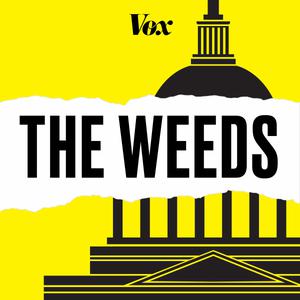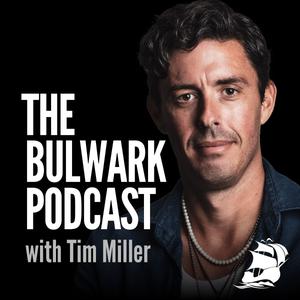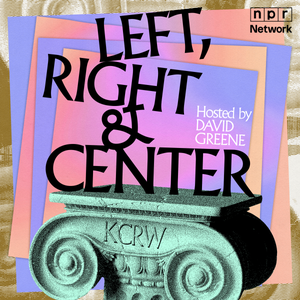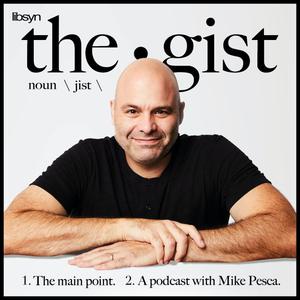
Very Serious with Josh Barro
Josh Barro, Very Serious Media
Josh Barro's newsletter about politics, the economy and culture. www.joshbarro.com
- 40 minutes 9 secondsDavid Schleicher on the Fiscal Whipsaw in State Governments
How are state and local governments faring post-COVID? It's a pretty different picture than what we're seeing with the federal budget deficit. States enjoyed generous federal aid and surprisingly strong tax collections during the pandemic. In 2021, state governments were flush — sometimes, they even made responsible choices, making deposits into their pension funds and building up their rainy-day funds to extremely high levels. Other states committed to new programs and spending. Now it's a mixed bag. To talk about how the states are managing all of that, I talked to Yale Law School professor David Schleicher, an expert on state and local government finance, for a wide-ranging conversation about how states have (and have not) learned the lessons of their budget crises from the Great Recession, and how they’re adjusting to once-again lean times.
Visit joshbarro.com for a transcript of this episode and to sign up for my newsletter.
This is a public episode. If you’d like to discuss this with other subscribers or get access to bonus episodes, visit www.joshbarro.com/subscribe7 July 2023, 2:00 pm - 54 minutes 54 secondsThe Martini Police, with Peter Suderman
We are back with Peter Suderman’s semi-annual visit to the Very Serious podcast! Getting ready for spring, Peter and I talked about best practices for muddling fresh fruit into cocktails. We talked about Peter’s philosophy of the 41-bottle bar, about his favorite non-alcoholic cocktails, and about why he has no use for vodka. We also talked about “x-tini” cocktails — relics of the bad old days (the 1980s and the 1990s) when bars would mix together any brightly colored fruit liqueur with spirits and sour mix and who knows what else and call the drink some kind of “-tini.” But we also talked about a silver lining of that age — the espresso martini, birthed then and once again popular today, which Peter has methods for improving (think gin or mezcal).
Visit joshbarro.com for a transcript of this episode and links for the books, bottles and recipes we reference.
This is a public episode. If you’d like to discuss this with other subscribers or get access to bonus episodes, visit www.joshbarro.com/subscribe21 April 2023, 11:13 am - 33 minutes 4 secondsJason Furman on the Inflation That Keeps Going and Going and Going
We’re back with another episode of the Very Serious podcast, and this episode has a friend of the show: Prof. Jason Furman, who teaches economics at Harvard.
Or, as Jason put it to me, he’s a bit of a foul-weather friend of the show:
Jason: Inflation does fluctuate a bit. Sometimes it looks a little bit better — during those times, you don't have me on your show. Sometimes it looks a little bit worse, and then you desperately call me and want me back on your show.
I suggested that the Jason Furman Very Serious Index could be yet another inflation indicator to keep an eye on, among all the others.
Jason: Yeah. And the big open question is, is that a lagging indicator of past inflation, or does that help us predict future inflation?
Indeed, the inflation outlook has worsened in the last few months. It looked like we were making progress in cooling inflation toward the end of 2022, but after a combination of revisions to data and hotter reports in recent months, it now looks like we haven’t actually made much progress at all. At the same time, the economy has continued to show decent growth and strong job gains — a set of facts that have economic analysts talking less about soft and hard landings and more about “no landing”: the possibility that we will avoid recession for a substantial period while also experiencing persistently too-high inflation.
I talked with Jason about why inflation hasn’t come down much despite the Fed’s substantial interest rate increases, what can be done to tame inflation over the next year, and how we have ended up with the Fed as “the only game in town” — with monetary policy being the only useful policy lever, even if it is an imperfect one, for taming inflation.
This is a public episode. If you’d like to discuss this with other subscribers or get access to bonus episodes, visit www.joshbarro.com/subscribe10 March 2023, 12:35 am - 47 minutes 32 secondsNational Lessons from New York's Red Wave, with Ross Barkan
There was no national “Red Wave” in last November’s elections, but there sure was one in New York. Republicans won a clean sweep on Long Island, even washing George Santos into Congress. They lost Asian and Hispanic support in New York City, turning swathes of Brooklyn red and Queens purple. I invited progressive journalist Ross Barkan to talk about what happened in New York, and what Republicans and Democrats across the country can learn from it. We discussed crime, schools, future housing policy that might be more possible now because Democrats lost the suburbs, and also ornery billionaire James Dolan, who owns the New York Knicks and Rangers, Madison Square Garden and Radio City Music Hall and is using facial recognition technology to bar his enemies from his entertainment venues.
Visit joshbarro.com to sign up for my newsletter and to find a transcript of this episode and other relevant links.
This is a public episode. If you’d like to discuss this with other subscribers or get access to bonus episodes, visit www.joshbarro.com/subscribe5 February 2023, 6:31 pm - 51 minutes 39 secondsThe answer to homelessness and homeownership is supply, with Jerusalem Demsas
A few weeks back, I wrote about the ethic of homeownership, and how I think it is unlikely to be dislodged from American society. If we’re going to improve our housing policy and ensure more adequate supply, we’re going to have to work with that ethic, not against it. And I think that’s a feasible thing to do. That piece was a response to an article in The Atlantic by Jerusalem Demsas, and I wanted discuss housing issues in more depth with her. The result, I think, is a really interesting conversation — starting with how the housing shortage causes homelessness, moving through the politics of building support for more housing supply, and then talking about the homeownership society — why Americans want to own, when that’s the right impulse, when that’s misguided, and what can be done to make renting and owning good options for the circumstances they suit.
Find our newsletter and ways to support the show at joshbarro.com, plus relevant links and a transcript of this episode.
This is a public episode. If you’d like to discuss this with other subscribers or get access to bonus episodes, visit www.joshbarro.com/subscribe15 January 2023, 11:01 am - 27 minutes 20 secondsTim Lee on Dads Who "Lean Out"
Tim Lee is the author of Full Stack Economics and one of my favorite reads on business and the economy. He’s also a parent to three children under the age of seven, and a major reason he quit his full-time journalism job to go independent — even though he knew it would reduce his income — was so he could maintain a flexible schedule and be more available to attend to the needs of his children. Tim recently wrote about this choice, and he wrote a follow-up piece in which he spoke with 20 other fathers whose wives are the primary breadwinners, and who either stepped back from work or quit entirely to raise a family. I had an interesting conversation with Tim about his experience, and what he thinks other families can learn from it. I hope you find it interesting.
This is a public episode. If you’d like to discuss this with other subscribers or get access to bonus episodes, visit www.joshbarro.com/subscribe2 November 2022, 12:08 am - 50 minutes 36 secondsWhy you should quit more, with Annie DukeThis is a free preview of a paid episode. To hear more, visit www.joshbarro.com
Retired professional poker player Annie Duke says quitting well — promptly realizing when your efforts aren’t working and redirecting resources to something more likely to be effective — is a badly underrated virtue. In this episode and in her new book Quit, Annie shares good advice and practical strategies to overcome our bias against quitting and to more quickly stop doing things that aren’t working for us.
Visit www.joshbarro.com for a transcript of this episode and more links.
10 October 2022, 7:08 pm - 36 minutes 7 secondsFall Cocktails with Peter SudermanThis is a free preview of a paid episode. To hear more, visit www.joshbarro.com
Peter Suderman is back by popular demand to talk about cocktails for fall. We talk about Negroni variations, the right sour drinks for sweater weather, best practices for hot and room-temperature cocktails (yes, that's a thing), and Peter's recipe for homemade Pumpkin Spice Old Fashioneds that contain real pumpkin.
One note: This is the first episode of the Very Serious podcast that has a longer, premium version for paying subscribers to Very Serious. If you're already a paying subscriber, you can get that longer episode in any podcast player except Spotify. You'll only have to set this up once: go to joshbarro.com/account, click on the option to set up your podcast player, and you'll be good to go for this and any future premium shows. And if you're not a premium subscriber, you can become one by going to joshbarro.com.Cheers!
23 September 2022, 6:27 pm - 46 minutes 6 seconds'Help! I can't stop reading advice columns, even though I know the questions are fake!'
This week's episode of Very Serious contains some un-bleeped profanity.
Have you noticed that advice columns are everywhere now? Have you noticed that most of the questions are fake, and yet you cannot stop reading them? Why? My friend Ben Dreyfuss has been getting into the advice business himself, taking the questions from popular advice columns and offering his own blunter, funnier, better advice. I invited Ben to talk with me about the advice column as a format, and the perverse incentives that lead publications to run questions everyone knows are fake. And Ben and I considered some letters together, just like I do in my own advice/Q&A column, which I call the Mayonnaise Clinic.
Visit joshbarro.com for episode notes, links and a transcript, and to sign up for the Very Serious newsletter.
This is a public episode. If you’d like to discuss this with other subscribers or get access to bonus episodes, visit www.joshbarro.com/subscribe15 September 2022, 6:52 pm - 50 minutes 28 secondsWhy Barack Obama, and the Democrats, Needed Joe Biden
Remember the Joe Biden and Barack Obama friendship bracelets from the 2020 campaign? That — and the whole Obama-Biden bromance meme — was cringe, and it was also an oversimplification of a much more interesting story. Gabriel Debenedetti, national correspondent for New York magazine, talks with me about their two-decade relationship that has shaped American politics in the 21st century. Gabe's new book (out Tuesday) is called The Long Alliance: The Imperfect Union of Joe Biden and Barack Obama. We talked about Obama's behind-the-scenes work to set up Hillary Clinton as the 2016 nominee, effectively boxing out Joe Biden; Biden's reputation for gaffes and his newsmaking interview endorsing gay marriage before Obama did; and Biden's relationship with his own vice president, Kamala Harris.
For a transcript of this interview and to subscribe to our newsletter, go to www.joshbarro.com.
This is a public episode. If you’d like to discuss this with other subscribers or get access to bonus episodes, visit www.joshbarro.com/subscribe9 September 2022, 6:26 pm - 33 minutes 53 secondsAdam Ozimek On Jobs, Remote Work, and Housing
“I think remote work really is a general purpose technology… It's more comparable to electrification. It's more comparable to the invention of the internal combustion engine or automobiles or something like that in the way that it's going to ripple through everything and it's going to have these longstanding big impacts." This week, I talk with Adam Ozimek, an economist whose recent work focuses on the intersection between labor markets and housing, about how the sharp increase in partial or fully remote work is transformative and simply very important for the ways it will change how many parts of the economy operate.
Visit www.joshbarro.com or a transcript of this episode and links.
This is a public episode. If you’d like to discuss this with other subscribers or get access to bonus episodes, visit www.joshbarro.com/subscribe5 August 2022, 5:11 pm - More Episodes? Get the App
Your feedback is valuable to us. Should you encounter any bugs, glitches, lack of functionality or other problems, please email us on [email protected] or join Moon.FM Telegram Group where you can talk directly to the dev team who are happy to answer any queries.
 Explain It to Me
Explain It to Me
 FiveThirtyEight Politics
FiveThirtyEight Politics
 The Bulwark Podcast
The Bulwark Podcast
 The Ezra Klein Show
The Ezra Klein Show
 Left, Right & Center
Left, Right & Center
 The Gist
The Gist